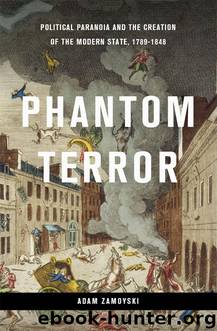Phantom Terror: Political Paranoia and the Creation of the Modern State, 1789-1848 by Adam Zamoyski

Author:Adam Zamoyski [Zamoyski, Adam]
Language: eng
Format: epub, azw3
ISBN: 9780465060931
Publisher: Basic Books
Published: 2015-02-09T11:00:00+00:00
19
The Duke of Texas
Tsar Alexander was still fixated on Spain. ‘He regarded Spain,’ the British minister plenipotentiary in Vienna, Sir Robert Gordon, reported to Castlereagh in May 1821, ‘as the tribune to which all the revolutionists of Europe have recourse, as to a vehicle from which they can disseminate their pernicious doctrine.’ The fall of Richelieu’s ministry in December 1821 had unsettled the tsar, and he feared that if the Spanish revolutionaries were permitted to continue, their ‘insolent victory’ might provoke revolution in France. Also, as he explained to Wellington, it was impossible for him, a monarch who relied so heavily on his army, to countenance anything that originated in military insubordination.1
He suggested marching a Russian army of 40,000 men through Austria and Italy into France, where it could be used to quell revolution if the need arose, or alternatively to invade Spain in order to restore King Ferdinand.
The hostility of the powers to the constitutional government in Spain, and the encouragement given to the king’s supporters by Ultras in France, had undermined the moderates and strengthened the extremists, known as exaltados. In the elections of 1822 they gained a majority, and Riego was elected president of the Cortes. Civil war loomed as the government held the king a virtual captive in Madrid, and a group of royalists gathered in Catalonia and set up a regency in his name.2
Metternich now took the view that what was happening in Spain was ‘one of the greatest plagues which have been reserved to our century’. The language in which his letters were couched was by now verging on the pathological: in June he had assured Lebzeltern that the conspiracy had penetrated ‘every vein of the body of society’. ‘This revolution is special in that it is the premeditated work of a faction spread across the whole of Europe,’ he wrote to Vincent in Paris on 5 July 1822, with the Parisian comité directeur dispensing ‘considerable funds’ to finance revolutions wherever it chose. He had reached the conclusion that the Carbonari, the Teutomaniacs, Bonapartists, Neapolitan, Spanish and other rebels had ‘consummated their fusion’ into one organisation.3
Events in Spain could not be divorced from what was happening in its former colonies in the Americas, from Mexico to Peru. These had by now almost entirely broken free of Spain, and this confronted the European powers with the dilemma of whether to recognise them as independent states, thereby sanctioning revolution. ‘There are already enough republican ideas in the world,’ René de Chateaubriand, France’s ambassador in London, said to Castlereagh during an interview on 10 April 1822; ‘to increase the sum of these ideas is to compromise more and more the fate of monarchy in Europe.’ Castlereagh, who had acceded to the title of Marquess of Londonderry on the death of his father the preceding year, assured him that the British cabinet was ‘by no means disposed to recognise the revolutionary governments’. Chateaubriand suggested they direct their efforts ‘to bringing monarchies into existence in the New World rather than these republics, which will send us their principles with the products of their soil’.
Download
Phantom Terror: Political Paranoia and the Creation of the Modern State, 1789-1848 by Adam Zamoyski.azw3
This site does not store any files on its server. We only index and link to content provided by other sites. Please contact the content providers to delete copyright contents if any and email us, we'll remove relevant links or contents immediately.
| Anthropology | Archaeology |
| Philosophy | Politics & Government |
| Social Sciences | Sociology |
| Women's Studies |
The Secret History by Donna Tartt(19053)
The Social Justice Warrior Handbook by Lisa De Pasquale(12187)
Thirteen Reasons Why by Jay Asher(8894)
This Is How You Lose Her by Junot Diaz(6877)
Weapons of Math Destruction by Cathy O'Neil(6266)
Zero to One by Peter Thiel(5787)
Beartown by Fredrik Backman(5737)
The Myth of the Strong Leader by Archie Brown(5500)
The Fire Next Time by James Baldwin(5431)
How Democracies Die by Steven Levitsky & Daniel Ziblatt(5216)
Promise Me, Dad by Joe Biden(5141)
Stone's Rules by Roger Stone(5081)
A Higher Loyalty: Truth, Lies, and Leadership by James Comey(4954)
100 Deadly Skills by Clint Emerson(4921)
Rise and Kill First by Ronen Bergman(4780)
Secrecy World by Jake Bernstein(4741)
The David Icke Guide to the Global Conspiracy (and how to end it) by David Icke(4709)
The Farm by Tom Rob Smith(4502)
The Doomsday Machine by Daniel Ellsberg(4484)
